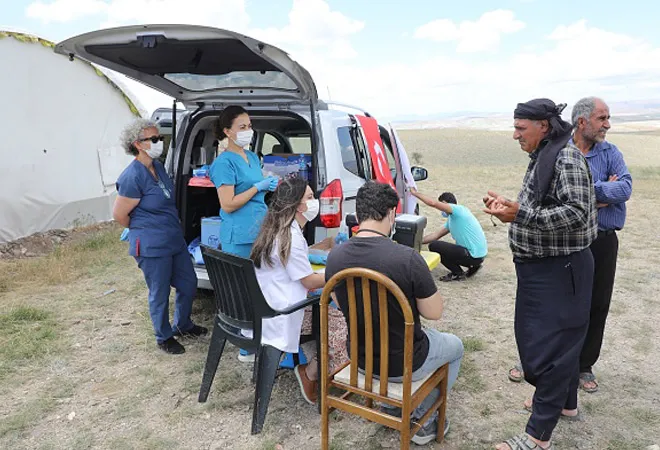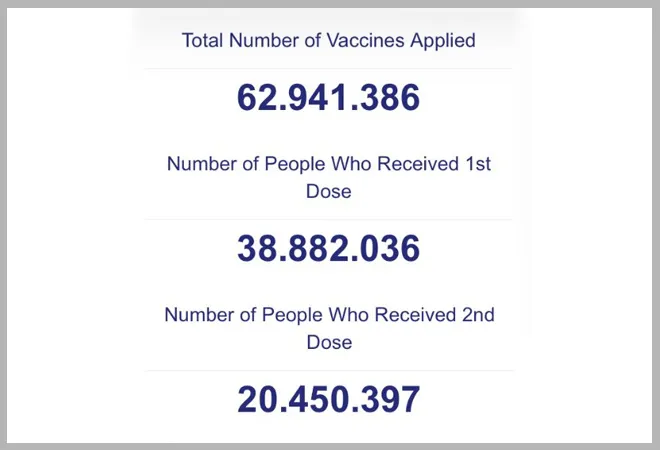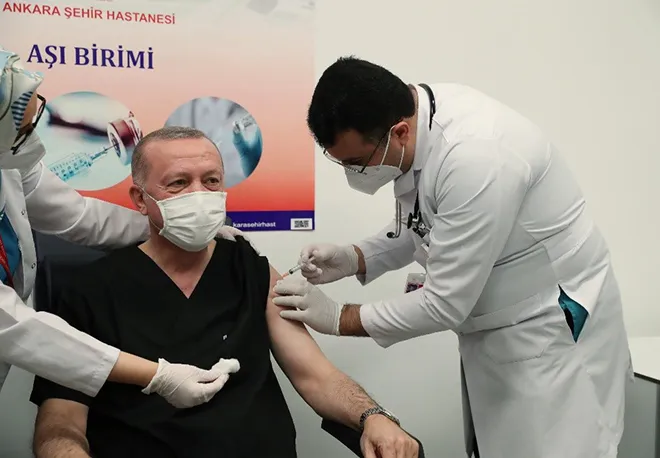 This article is part of the series The COVID-19 Vaccine Challenge: Contextual and Country Analysis.
This article is part of the series The COVID-19 Vaccine Challenge: Contextual and Country Analysis.
The emergence of a new coronavirus pandemic has brought the globe to a halt. The first case of the novel coronavirus was discovered in late December 2019 in Wuhan, China. The World Health Organisation (WHO) labelled the coronavirus pandemic outbreak a Public Health Emergency of International Concern (PHEIC) on 30 January 2020, and the Director General of the WHO recognised it as a “pandemic” on 11 March 2020. The COVID-19 pandemic has had a significant impact on global health, as well as other elements of life such as education, politics, public safety, and the economy. Despite significant hurdles in combating the COVID-19 outbreak, governments around the world responded differently to the outbreak and achieved varying degrees of success.
Because of its geographical location at the crossroads of Asia and Europe, as well as the presence of visitors from all over the world, Turkey was one of the countries largely impacted by the COVID-19 outbreak, which spread through social interaction. Policies based on risk and crisis management concepts were devised in the management of the COVID-19 pandemic, taking into account the conditions that arise in nearly every aspect of life, from health to travel, education, economy, and tourism. Responding early to the possibility of a pandemic, Turkey’s Health Ministry established the Coronavirus Science Board on 10 January 2020, 11 days after China declared the outbreak in Wuhan and two months before the first case was reported in Turkey.
Turkey was one of the countries largely impacted by the COVID-19 outbreak, which spread through social interaction
Turkey is amongst those countries that successfully continue the pandemic process due to its state-nation solidarity, competent leadership, and strong organisational structure in its fight against COVID-19. The Turkish Ministry of Health successfully blocked the virus’ first spread after it entered the country on 11 March 2020, and has since played a critical role in Turkey's successful fight against COVID-19. The resilience of Turkey's healthcare system, which assisted in controlling the COVID-19 pandemic and, thus, preventing its deadly consequences, was cited as a crucial factor in the country's effective pandemic management. As of August 19, Turkey has recorded over 6 million COVID19 cases. In addition, Turkey has reported 50,000 coronavirus deaths. Over 61 million coronavirus tests have been done, as of early July this year, and more than 5.6 million patients have won the battle against the virus and recovered.
Turkey’s durable health infastructure
Since 2002, Turkey has been implementing the Health Transformation Programme, a health reform project. Through massive expenditures in health infrastructure, this initiative encompasses and strengthens practically all of the building blocks of Turkey's health systems, from management to health funding and health service delivery. This strong health system was vital to Turkey's effective and successful fight against the SARS-CoV-2 pandemic. As a result of its investments in the healthcare sector, Turkey had no significant disruptions in health services during the outbreak.
City (Şehir) hospitals, built on the public-private partnership model and equipped with qualified and single patient rooms, multiple intensive care beds, and units outfitted with cutting-edge medical technology and materials, played a significant role in service delivery, particularly in large cities.
In response to the outbreak, Turkey set up two outbreak hospitals, each with a capacity of accommodating 1,008 beds, in as little as 45 days. It became one of just two countries in the world capable of constructing hospitals in such a short period of time. City (Şehir) hospitals, built on the public-private partnership model and equipped with qualified and single patient rooms, multiple intensive care beds, and units outfitted with cutting-edge medical technology and materials, played a significant role in service delivery, particularly in large cities. During the outbreak, 17 huge city (Şehir) hospitals were opened in various Turkish cities, all of which could be turned into intensive care units. In 81 Turkish cities, 177 epidemic hospitals with level 3 adult intensive care beds were identified. During the outbreak, public hospitals boosted their adult intensive care bed capacity by 51 percent. When compared to most European countries, Turkey has the highest critical care bed capacity per 100,000 of the population.
| Countries |
Number of Beds |
Years |
| Turkey |
56,9 |
2020 |
| Germany |
33,9 |
2020 |
| Belgium |
29,4 |
2020 |
| Spain |
9,5 |
2020 |
| Australia |
8,9 |
2020 |
| Italy |
8,4 |
2020 |
| France |
8,2 |
2020 |
| Holland |
6,7 |
2020 |
| United Kingdom |
6,2 |
2020 |
Number of Intensive Care Beds Per 100,000 People
Source: Türkiye’nin Koronavirüsle Başarılı Mücadelesi.
The domestic fabrication of various devices was one of the most crucial initiatives Turkey took in the fight against COVID-19. COVID-19 diagnostic test kits had a wide range of medical equipment, including masks, visors, protective glasses, protective coveralls, ventilators, medicine, disinfectants, thermal cameras, and portable gadgets.
Turkey has pledged to offer
free diagnosis, treatment, follow-up, and critical care services to Turkish citizens and asylum seekers, as well as complete access to healthcare. In addition, Family Physicians and family health experts, as well as a mobile app called "Life Fits Into Home" (
HES), have made significant contributions towards tracking and monitoring COVID-19 patients, their diagnoses, and follow-up.
Qualified health workers are one of the most powerful elements of the Turkish Health System in controlling the COVID-19 pandemic and preventing the disastrous repercussions that have occurred in several countries.
Turkey's capacity in terms of health infrastructure and personnel has developed a very strong foundation for its national fight against coronavirus. Qualified health workers are one of the most powerful elements of the Turkish Health System in controlling the COVID-19 pandemic and preventing the disastrous repercussions that have occurred in several countries. The efficient use of Turkey's well-trained and motivated health professionals has allowed for good diagnosis, treatment, and care services. Turkey boosted its anti-epidemic measures in April 2020 by hiring 32,000 additional health employees to support health worker capacity.
Turkey’s vaccine supply and vaccination
To secure an early supply of vaccines, Turkey had to import all of them, while domestic vaccine production (TURKOVAC) continued. It has inked vaccine purchase agreements with many pharmaceutical companies on the cutting edge of COVID-19 vaccine development. On 13 January 2021, Turkey initiated the COVID-19 vaccine campaign with the vaccination of Health Minister Fahrettin Koca.
With its robust health infrastructure and administration, Turkey is one of the few countries that hasn’t had problems with vaccine supply and vaccination programmes. The first phase of Turkey's COVID-19 vaccination programme was quick and efficient. Numerous factors contributed to the early success of the vaccination practice in the country. The presidential system and its experience in planning and conducting swift reaction to catastrophes, as well as its strong health infrastructure are amongst these characteristics. Health plans, hospitals, a tradition of efficient cooperation, and the availability of a staff of well-trained nurses were amongst the elements that contributed to the quick spread of vaccination. Furthermore, the Turkish Ministry of Health's "AŞILA" application, which enables the execution of the entire process from vaccine logistics to vaccine application to citizens, has made a significant contribution to vaccination follow-up. It has overcome challenges such as transport, storage, and cold chain requirements throughout the entire supply chain in terms of successful vaccine plan execution in vaccination practise as well as vaccine supply, and has delivered millions of doses to millions of people in a very short period of time.
The Turkish Ministry of Health's "AŞILA" application, which enables the execution of the entire process from vaccine logistics to vaccine application to citizens, has made a significant contribution to vaccination follow-up.
According to Ministry of Health figures, as of 17 July 2021, out of 83 million people, 62,941,386 persons had been vaccinated in Turkey. The number of people who only received the first dosage of the vaccine surpassed 38,882,036, while the number of persons who received second doses approached 20,450,397. Along with CoronaVac, the Pfizer-BioNTech vaccine is available to the Turkish public.
 Source: Republic Of Turkey, Ministry Of Health
Source: Republic Of Turkey, Ministry Of Health
The possible causes of COVID-19 vaccination hesitancy in Turkey can be investigated from a variety of angles—the notion that the COVID-19 vaccinate was designed by foreign players, the lack of trust in the pharmaceutical business, and the rumours that the spread of COVID-19 was tied to 5G technology. As a result, those who believe these theories are hesitant to get vaccinated.
Several measures have been tried in Turkey to raise awareness about the vaccine.
One critical step is the launch of a multifaceted information campaign to allay vaccine fears and overcome scepticism. It used mass media, social media, corporate websites, and other tools to accomplish this. Furthermore, it provided daily updates on the number of citizens vaccinated, accompanied by video clips and photos of the large number of people getting vaccinated. Furthermore, photos, videos, and vaccination discourses by Turkish President
Recep Tayyip Erdogan and intellectual leaders have played an important role in encouraging the general population to avail the vaccine.
 Source: https://twitter.com/rterdogan/status/1349743472933273601
Source: https://twitter.com/rterdogan/status/1349743472933273601
Many aspects, such as numerous facilitators including making an appointment by phone call to the call centre, by computer through the health plan website, or by mobile phone through a health plan app, are amongst the facilitators that individuals can use to get easily vaccinated. In addition, another significant step forward in vaccination was the implementation of the Ministry of Health's 'on-site vaccination application' (Yerinde Aş Uygulaması), which allowed people to be vaccinated without having to make an appointment outside of health centres. In order to vaccinate a large number of individuals, health measures such as opening extra vaccination facilities and dispatching mobile vaccination units to rural areas were implemented.
As a result, several countries continue to confront difficulties in vaccinating their populations. So far, Turkey has achieved early success by overcoming challenges in immunisation implementation. Whether and to what extent Turkey can retain its success in vaccination will depend on the ability to continue developing good policies unique to the vaccination problem.
The views expressed above belong to the author(s). ORF research and analyses now available on Telegram! Click here to access our curated content — blogs, longforms and interviews.



 This article is part of the series
This article is part of the series 

 PREV
PREV


